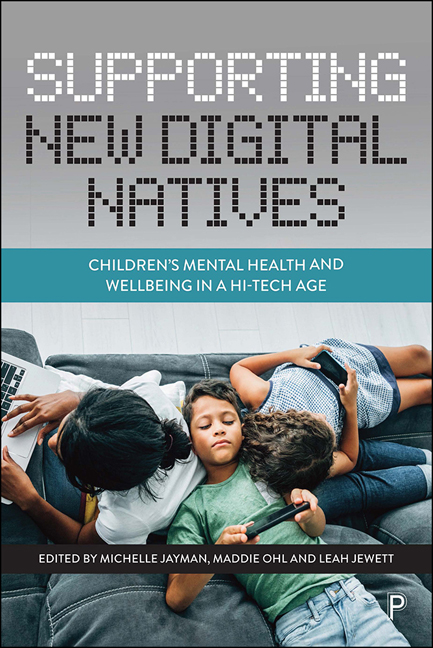Book contents
- Frontmatter
- Dedication
- Contents
- List of figures and tables
- Glossary
- Notes on contributors
- Foreword
- Preface
- 1 Digital lives: growing up in a hi-tech world and staying mentally healthy
- 2 Pyramid Club: building skills for healthy friendships and relationships in a digital age
- 3 Supporting children’s healthy socio-emotional development through play: Book of Beasties – the mental wellness card game
- 4 The School Counselling Partnership: providing support and promoting self-care for school communities
- 5 The Breeze Project: supporting children and young people through Forest School
- 6 Promoting the mental health of girls and young women in the community: the role of Girlguiding
- 7 Supporting families to navigate the changing sex-education landscape: Outspoken Sex Ed
- 8 The Lift Off programme by Red Balloon: online learning and wellbeing support for children who self-exclude from school
- 9 The LifeMosaic project: supporting wellbeing and empowering pupils through design, development and research
- 10 Building better mental wellbeing for children: rebel thinking and innovative practice
- Index
10 - Building better mental wellbeing for children: rebel thinking and innovative practice
Published online by Cambridge University Press: 13 May 2022
- Frontmatter
- Dedication
- Contents
- List of figures and tables
- Glossary
- Notes on contributors
- Foreword
- Preface
- 1 Digital lives: growing up in a hi-tech world and staying mentally healthy
- 2 Pyramid Club: building skills for healthy friendships and relationships in a digital age
- 3 Supporting children’s healthy socio-emotional development through play: Book of Beasties – the mental wellness card game
- 4 The School Counselling Partnership: providing support and promoting self-care for school communities
- 5 The Breeze Project: supporting children and young people through Forest School
- 6 Promoting the mental health of girls and young women in the community: the role of Girlguiding
- 7 Supporting families to navigate the changing sex-education landscape: Outspoken Sex Ed
- 8 The Lift Off programme by Red Balloon: online learning and wellbeing support for children who self-exclude from school
- 9 The LifeMosaic project: supporting wellbeing and empowering pupils through design, development and research
- 10 Building better mental wellbeing for children: rebel thinking and innovative practice
- Index
Summary
‘The health and wellbeing of today's children depend on us having the courage and imagination to rise to the challenge of doing things differently’ (Marmot, 2010, p 29)
Children and young people's mental wellbeing is one of the most critical health issues the world is facing today. Enjoying a mentally healthy life is inextricably linked to the environment in which we grow and develop. In the early decades of the 21st century, digital technologies are often tightly interwoven into everyday life from infancy, spawning a unique generation of new digital natives (NDNs). The digital realm is vastly networked and many children are exposed to a world far beyond their immediate family, school and friendship groups. The ubiquity of digital technologies and their mediating role across crucial aspects of children's lives has generated keen interest in the implications for their mental and physical wellbeing. Studies which suggest a raft of nefarious effects on children's wellbeing have been criticised for methodological flaws (Orben and Przybylski, 2019), yet such research has influenced key policy decisions including restrictive measures which attempt to limit children's access to technologies. Nonetheless, powerful evidence, including research by Twenge et al (2019) linking mood disorders and suicide-related outcomes among younger generations with digital technology use, supports adopting a cautionary approach. Certainly, research in this area is still emerging and the relative benefits vis-à-vis the potential risks and harm to children continue to be fiercely debated.
In 2020, a deadly virus arrived in the midst of our everyday lives, spreading indiscriminately across the globe. The impact of COVID-19 on the subject matter of this book has been profound: the pandemic has adversely affected children's mental wellbeing while simultaneously triggering their greater reliance on, and immersion in, the digital realm. Technology has been children's gateway to learning, living and staying connected with the world. The original intention of this book was to consider children's mental wellbeing in the context of growing up in a highly digitalised world. In the wake of a 21st-century pandemic, this principal focus has assumed an even greater resonance. The urgent need for effective, meaningful interventions to support and protect a generation of children is more pressing now than ever.
- Type
- Chapter
- Information
- Supporting New Digital NativesChildren's Mental Health and Wellbeing in a Hi-Tech Age, pp. 175 - 198Publisher: Bristol University PressPrint publication year: 2021

